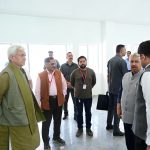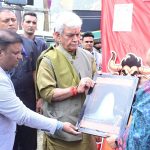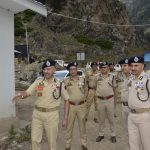Baramulla, Aug 28: The Associated Hospital Government Medical College (AHGMC) in Baramulla is making commendable strides in treating more than 800 children through the Rashtriya Bal Swasthya Karyakram (RBSK) programme, a key initiative of the National Health Mission (NHM), at the district early intervention centre.
Aimed at early identification and intervention for children, RBSK targets defects, deficiencies, diseases, and developmental delays.
Dr Parvaiz Masoodi, Medical Superintendent GMC Baramulla said that the District Early Intervention Centre at AHGMC Baramulla is currently providing comprehensive assistance to children facing various health challenges.
“Among the beneficiaries, 374 children within the age range of 0-18 are receiving treatment and support for severe anaemia, with a haemoglobin level as low as 4.5. The initiative extends not only medical care but also financial aid, all free of charge,” he said.
Dr Aaliya, a paediatrician at the Early Intervention Centre, AHGMC Baramulla revealed that 75 children have been diagnosed with congenital heart disease, while 150 children are coping with convulsive disorders.
“Additionally, 35 children grapple with cerebral palsy and mental retardation, and 20 children have received hearing aids. Another 12 children born with conditions like cleft lip and cleft palate have been equipped with special aids, including long nipple feeding bottles,” she told Rising Kashmir.
Financial assistance has been extended to 71 children requiring interventions such as cleft lip, palate, or hearing aids.
Dr Aaliya underscored the significance of the RBSK program, which commenced under NHM in 2014.
RBSK teams conduct screenings at schools, both government and private, anganwadi centres, and delivery points. The initiative encompasses the four ‘D’s: Defects at birth, Deficiencies, Diseases, and Developmental delays, including disabilities.
“In this program, RBSK teams visit educational institutions, anganwadi centres, and delivery points to identify and address various health challenges in children, offering medication, assistance, aids, and services at no cost,” Dr Aaliya added.
Children found with health issues are treated free of charge at early intervention centres, receiving essential medical care, medications, and, when needed, financial support.
Dr Aaliya highlighted the collaboration among various departments, including paediatrics, orthodontics, ENT, ophthalmology, physiotherapy, and psychiatry, to ensure holistic care for patients. “Children with conditions like congenital heart defects, neural tube defects, clubfoot, and malnutrition receive treatment either at peripheral blocks or district early intervention centres,” she said
Cases beyond these facilities’ scope are referred to GMC Baramulla’s DEIC.
Among the achievements, Dr Aaliya proudly shared the story of two children who underwent successful cochlear implant surgeries at AHGMC Baramulla, brightening the lives of their parents.
Medical Superintendent AHGMC said that the cochlear implant for congenital hearing loss was performed for the first time at GMC Baramulla by two renowned ENT surgeons from AIIMS Delhi. He said that each cochlear implant, valued at approximately Rs 6 lakh, was also provided free of charge.








